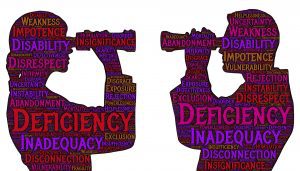 It’s a common complaint, “I can’t be me in this relationship. Ive lost myself and don’t know who I am.” But is it true that the other person defines you?
It’s a common complaint, “I can’t be me in this relationship. Ive lost myself and don’t know who I am.” But is it true that the other person defines you?
Balancing Our Individuality
Finding a balance between our individuality and our intimate connections takes some work. It requires getting a good handle on who we are in the relationship rather than focusing on how the other person makes us feel. The more we know who we are and have developed our identity, the healthier we’ll be when interacting with another person. Do you know what you think, feel and believe to be true regardless of what your partner says? Can you voice your thoughts and feelings openly? Or are you easily influenced by the other person and uncertain as to what you believe?
As we mature, we struggle with these kinds of questions until, hopefully, we have some ideas. But many of us never really develop a sense of identity apart from our original families or others. Consequently, we carry that undefined self into our relationships. When this happens, problems emerge. We have difficulty finding balance between who we are and the demands of others.
Developing a Sense of Self
When a person hasn’t developed a sense of self apart from others, he or she usually operates from one of two extremes. Either he/she uses distance, both physical and emotional, to cope with relationship problems, or becomes excessively close and dependent on the other. And the smallest conflict becomes a blowup because you haven’t learned to establish appropriate boundaries or assert youself in relationships.
People who lack a strong identity usually have parents with the same problem. After all, we learn by example. A family exerts a powerful influence over who we become. They have much to say, and it’s hard work to figure out what you think and feel when everyone has an opinion. But you can do it and develop a mind of your own.
So what does it mean to take an “I” position and still be you in a relationship? Simply put, it means being true to self while relating to others. You can have your own opinions, think your own thoughts and behave in ways you know to be right, yet still love and relate to other people. You also can decide what’s right and true for you without becoming defensive, angry and highly emotional. It’s important to work on intimacy because the desire of every intimate relationship is to be known and appreciated by the other. It’s also a sign of your maturity when you can think, feel and behave according to your beliefs without overreacting to emotional triggers from others.
Our task then as an individuals is to balance our need for intimacy with our need to be autonomous. To do this, we must continue to develop a better sense of our “I” to lend to the “we.” Then we can begin to sort out our needs versus the needs of others and be less reactive in the way we treat others.
As we develop a better sense of autonomy, we also can come to appreciate our differences and learn to communicate more honestly. When we don’t agree, we don’t have to fear that our sense of self will be lost in the relationship; we’ll recognize when we are allowing that to happen—and stop it. The issues is, we can be in a relationship with out losing a sense of who we are along the way.


